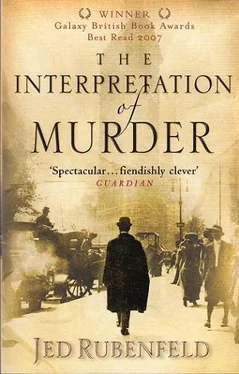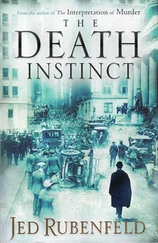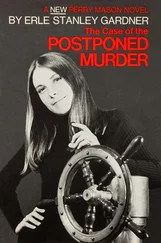Jed Rubenfeld - The Interpretation of Murder
Здесь есть возможность читать онлайн «Jed Rubenfeld - The Interpretation of Murder» весь текст электронной книги совершенно бесплатно (целиком полную версию без сокращений). В некоторых случаях можно слушать аудио, скачать через торрент в формате fb2 и присутствует краткое содержание. Жанр: Исторические приключения, на английском языке. Описание произведения, (предисловие) а так же отзывы посетителей доступны на портале библиотеки ЛибКат.
- Название:The Interpretation of Murder
- Автор:
- Жанр:
- Год:неизвестен
- ISBN:нет данных
- Рейтинг книги:5 / 5. Голосов: 1
-
Избранное:Добавить в избранное
- Отзывы:
-
Ваша оценка:
- 100
- 1
- 2
- 3
- 4
- 5
The Interpretation of Murder: краткое содержание, описание и аннотация
Предлагаем к чтению аннотацию, описание, краткое содержание или предисловие (зависит от того, что написал сам автор книги «The Interpretation of Murder»). Если вы не нашли необходимую информацию о книге — напишите в комментариях, мы постараемся отыскать её.
The Interpretation of Murder — читать онлайн бесплатно полную книгу (весь текст) целиком
Ниже представлен текст книги, разбитый по страницам. Система сохранения места последней прочитанной страницы, позволяет с удобством читать онлайн бесплатно книгу «The Interpretation of Murder», без необходимости каждый раз заново искать на чём Вы остановились. Поставьте закладку, и сможете в любой момент перейти на страницу, на которой закончили чтение.
Интервал:
Закладка:
I had expected Freud to be present at my initial sessions with Miss Acton. Instead, he instructed me to report to him afterward. His presence, he felt, would disrupt the transference.
The transference is a psychoanalytic phenomenon. Freud discovered it by accident, and much to his surprise. Patient after patient reacted to analysis by worshiping him — or occasionally by hating him. At first he tried to ignore these feelings, viewing them as unwelcome and unruly intrusions into the therapeutic relationship. Over time, however, he discovered how crucial they were, to both the patient's illness and the cure. The patient was reenacting, inside the analyst's office, the very same unconscious conflicts that caused the symptoms, transferring to the doctor the suppressed desires that lay at the heart of the illness. This was not fortuitous: the entire disease of hysteria, Freud had found, consisted of an individual's transferring to new persons, or sometimes even to objects, a set of buried wishes and emotions formed in childhood but never discharged. By dissecting this phenomenon with the patient — by bringing the transference to light and working it through — analysis makes, the unconscious conscious and removes the cause of the illness.
Thus the transference turned out to be one of Freud's most important discoveries. Would I ever have an idea of comparable importance? Ten years ago, I thought I already had. On December 31, 1899, I excitedly announced it to my father, actually interrupting him in his study a few hours before the guests would arrive for the New Year's Eve dinner party my mother always threw. He was quite surprised and, I suppose, irritated that I would bother him at his work, although of course he didn't say so. I told him I had made a discovery of potentially great moment and asked permission to inform him. He tilted his head. 'Proceed,' he said.
Since the dawn of the modern age, I argued, a peculiar fact held true of all man's supreme revolutionary bursts of genius, whether in art or in science. Every one of them had occurred at the turn of a century and — more specifically still — in the first decade of the new century.
In painting, poetry, sculpture, natural science, drama, literature, music, physics — in each one of these fields — which man and which work, above all others, has the best claim to world-altering genius, the kind of genius that changes the course of history? In painting, the cognoscenti uniformly point to the Scrovegni Chapel, where Giotto reintroduced three-dimensional figuration to the modern world. He painted those frescoes between 1303 and 1305. In verse, surely the crown belongs to Dante's Inferno, the first great work written in the vernacular, begun soon after the poet's banishment from Florence in 1302. In sculpture, there is only one possibility, Michelangelo's David, carved from a single block of marble in 1501. That same year marked the fundamental revolution of modern science, for it was then that a certain Nicolaus of Torun traveled to Padua, ostensibly to study medicine but secretly to continue the astronomical observations from which he had glimpsed a forbidden truth; we know him today as Copernicus. In literature, the choice has to be the grandsire of all novels, Don Quixote, who first tilted at windmills in 1604.
In music, none will dispute Beethoven's pathbreaking symphonic genius: he composed his First in 1800, the defiant Eroica in 1803, the Fifth by 1807.
This was the case I made to my father. It was juvenile, I know, but I was seventeen. I supposed it a great thing to be alive at the turn of a century. I predicted a wave of groundbreaking works and ideas in the next few years. And what would one not give to be alive at the turn of the millennium a hundred years hence!
'You are certainly — enthusiastic' was my father's phlegmatic reply. His only reply. I had made the mistake of showing excitement. Enthusiastic was for my father a term of utmost deprecation.
But my enthusiasm was vindicated. In 1905, an unknown Swiss patent agent of German-Jewish extraction produced a theory he called relativity. Within twelve months, my professors at Harvard were saying that this Einstein had changed our ideas of space and time forever. In art, I concede, nothing happened. In 1903, the crowd at St. Botolph's made a great fuss over a Frenchman's water lilies, but these proved to be the work of an artist who was merely losing his eyesight. When it came, however, to man's understanding of himself, my predictions were again fulfilled. Sigmund Freud published his Interpretation of Dreams in 1900. My father would have scoffed, but I am convinced that Freud too will have changed our thinking forever. After Freud, we will never look at ourselves or others in the same way again.
My mother was always 'protecting' us from my father. This was an irritant to me; I didn't need it. My elder brother did, but her protection in his case was quite ineffectual. What an advantage to come second: I saw it all. Not that I was favored, but by the time my father came around to me, I had learned to be impenetrable, and he could do no serious damage. I did have an Achilles' heel, however, which he eventually found. It was Shakespeare.
My father never said aloud that my fascination with Shakespeare was excessive, but he made his opinion clear: there was something unwholesome about my taking a greater interest in a fiction, especially Hamlet, than in reality itself, and something arrogant as well. Once only did he give voice to this sentiment. When I was thirteen, thinking no one home, I delivered Hamlet's What's Hecuba to him, or he to Hecuba, that he should weep for her? Possibly I sawed the air a little hard on bloody, bawdy villain; conceivably I was a little earsplitting on Oh vengeance! or Fie upon 't! Foh! My father, unbeknownst to me, witnessed the whole thing. When I was done, he cleared his throat and asked what Hamlet was to me, or I to Hamlet, that I should weep for him?
Needless to say, I had not wept. I have never cried at all, in conscious memory. My father's point, if not solely to embarrass me, was that my devotion to Hamlet could mean nothing in the scope of things: nothing in my future, nothing in the world. He wanted to make me understand this early on. He succeeded and, what's more, I knew he was right.
Yet that knowledge did not impair my devotion to Shakespeare. It will have been noticed that I left the poet of Avon off my list of world-changing geniuses. I also left him off the list when I made the case to my father in 1899. The omission was strategic. I wanted to see if my father might take the bait. It would have appealed to him to use my 'beloved Shakespeare,' as my father used to refer to him, against me. He was far too subtle to cite a Dickens or a Tolstoy: he would have seen at once that I would call them classic mid-century giants, masters of existing forms rather than inventors of new ones. But he also would have known that I could never deny the tide of revolutionary genius to Shakespeare, who might thus have been presented as an instant, devastating rebuttal of my argument.
Perhaps my father smelled the trap. Perhaps he knew his history better than I expected. At any rate he didn't ask, so I didn't get to tell him that Hamlet was written in 1600.
Nor did I get a chance to point out that I was hardly the only one impassioned about Shakespeare. Men were once ready to die over Hamlet. My father did not know it — indeed, nearly everyone has forgotten it — but there was once a riot over Hamlet even here in the uncultured United States. Only sixty years ago, the storied American actor Edwin Forrest toured England, where he saw the famous William Macready, the aristocratic British tragedian, playing the Prince of Denmark. Forrest volubly expressed his disgust. According to Forrest, who was of muscular build and haled from an impoverished, democratic upbringing, Macready's Hamlet pranced across the stage in effete, mincing steps absurd in themselves and degrading to the noble prince.
Читать дальшеИнтервал:
Закладка:
Похожие книги на «The Interpretation of Murder»
Представляем Вашему вниманию похожие книги на «The Interpretation of Murder» списком для выбора. Мы отобрали схожую по названию и смыслу литературу в надежде предоставить читателям больше вариантов отыскать новые, интересные, ещё непрочитанные произведения.
Обсуждение, отзывы о книге «The Interpretation of Murder» и просто собственные мнения читателей. Оставьте ваши комментарии, напишите, что Вы думаете о произведении, его смысле или главных героях. Укажите что конкретно понравилось, а что нет, и почему Вы так считаете.












